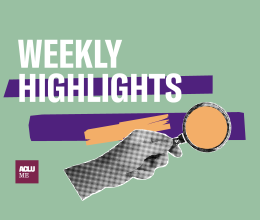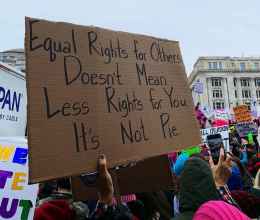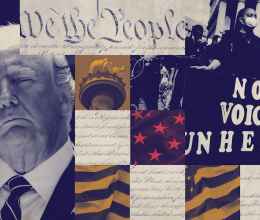The Wells-Ogunquit school district has taken an important step toward retiring its Native American mascot and ending years of discrimination. On May 24, 2018, an advisory committee recommended retiring the Native American imagery associated with its team name, the Warriors. The mascot currently features a Native American man’s head with a feathered headdress and bare chest, and a large “W” with a feather attached. Of the 25 advisory committee members, 17 voted in favor of ending the Native American mascot.
A harmful and discriminatory tradition
Studies have shown that Native American mascots lower “the self-esteem of American Indian students.” According to research, images such as Chief Wahoo (the mascot of the Cleveland Indians) decreased self-esteem even more than exposure to other negative Indian stereotypes. Jordan LaBouff, an assistant professor of psychology at the University of Maine, has agreed that stereotypical Native American imagery can harm Native American students.
Consistent with these findings, the United States Commission on Civil Rights has called to end Native American mascots in non-native schools because those mascots teach that it is acceptable to stereotype minority students. And in 2005, the American Psychiatric Association publicly called for “the immediate retirement of all American Indian mascots” because they instill “misleading, and too often, insulting images of American Indians.”
School-sanctioned Native American mascots also discriminate against Native American youth. For example, a recent case from a Maine court found discrimination against a Native American employee based on the employer’s messages of harmful stereotypes. In that case, the supervisor called the employee “Big Indian,” and called a female co-worker a “squaw” when she wore a braid.
Righting a wrong
Wells has faced complaints about its Native American mascot over the years, and the issue returned to the public spotlight after a football game last fall.
Amelia Tuplin, a member of the Micmac tribe, was visiting Wells to watch her son, a quarterback for Lisbon High School, play against the Wells team. She was accompanied by her other children—all of whom are Micmac. On the sidelines, Amelia saw the Wells mascot emblazoned across the media tower on the football field. She also saw Wells fans wearing headdresses and Native-American-style face paint, making whooping sounds and performing a mock chant.
After the game, Amelia spoke out against the Native American mascot and the other stereotypes that mocked sacred practices in the name of team spirit. Although the school originally found no misconduct, it later formed an advisory committee to consider the mascot. After discussions with indigenous leaders, public comment, and a letter from the ACLU of Maine, the advisory committee took the important step of recommending an end to the Native American Mascot.
“The arc of the moral universe is long, but it bends toward justice.”
Martin Luther King’s famous quote applies to the history of Native American mascots in Maine’s schools. In the past, many Maine schools had Native American mascots. Recognizing their harmful effects, schools have retired those mascots one by one. Now there are only two: Wells and Skowhegan. And with the recommendation of the Wells advisory committee, that number should soon dwindle down to one. If and when the Wells school committee acts to make the recommendation final, there will be just one school—Skowhegan—with the discriminatory mascot in place.
As Wells bends toward justice, Skowhegan should take note.









